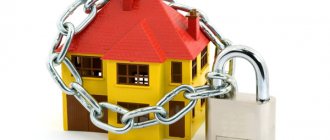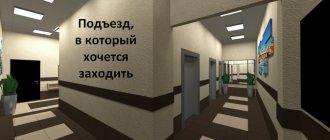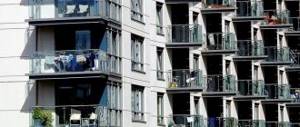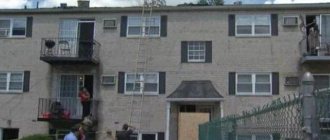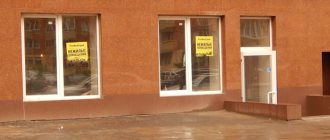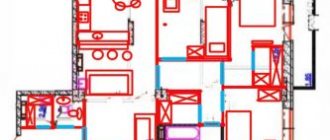How to find your basement in an apartment building.
Legal status of basements
In the Resolution of the Presidium of the Supreme Arbitration Court of the Russian Federation No. 13391/09 of March 2, 2010. installed:
“The legal regime of basement premises, whether or not they belong to the common shared ownership of several owners of premises in such residential buildings, should be determined on the date of privatization of the first apartment in the house.
If, as of the specified moment, the basement premises of a residential building were intended (accounted for, formed) for independent use for purposes not related to the maintenance of the residential building, and were not actually used as common property by the homeowners, then the right of common shared ownership of the homeowners to these premises is not arose. The remaining basement premises, not allocated for independent use, became the common shared property of the homeowners as the common property of the house.
At the same time, to determine the legal regime of the named premises, the presence of engineering communications in them did not and does not matter, since they are located in each basement and do not in themselves give rise to the right of common shared ownership of homeowners for premises already allocated for independent use, not related to maintenance of a residential building.
Since it was the privatization of housing by citizens that was the basis for the appearance of several owners in one house and the emergence of their right of common shared ownership of the common property of the house, including technical floors and basements, this right in relation to each house arose only once - at the time of privatization the first room in the house."
I will express my understanding of the interpretation of the legislation of the Russian Federation by the Presidium of the Supreme Arbitration Court of the Russian Federation.
From the above quote it follows that non-residential premises (basements, attics, etc.) cannot be classified as common shared ownership if, at the time of the first privatization of an apartment in the house, two conditions are met in relation to the non-residential premises of the house:
1. The premises are taken into account and configured for independent use.
2. The premises are not used as common property by the homeowners.
To determine the legal regime of basements, the mere presence of utility lines in them did not and does not matter, since they are located in each basement and do not in themselves give rise to the right of common shared ownership of the homeowners to the premises.
It is important when general engineering equipment is placed in these premises, BEFORE or AFTER the appearance of the first privatized apartment in the house.
That is, if communications and equipment (pipelines for hot and cold water supply, heating, sewerage, shut-off and drain valves and taps, power supply panel) serving more than one apartment in an apartment building are located in the basement before the start of privatization of the apartments, then this should clearly be interpreted as use of premises for the common purposes of the residents of the house, that is, as their use as common property.
This is established by Articles 289, 290 of the Civil Code of the Russian Federation and Article 36 of the Housing Code of the Russian Federation in the constitutional and legal interpretation of the Determination of the Constitutional Court of the Russian Federation No. 489-О-О dated May 19, 2009.
The regulatory document SNIP 31-01-2003, mandatory for use throughout the Russian Federation, defines such basements as technical.
Since communications and general-purpose equipment ensure the livelihoods and safety of residents of an apartment building, such use of basements should be considered a priority.
Consequently, they must be classified as the common property of the owners of the residential premises of the house, even if the first of the listed conditions is met.
If the use of basements for general purposes arose after the moment of the first privatization (for example, the placement of communications and general-purpose equipment, strollers, etc.), after the redistribution of the premises of the house between the owners determined by the legislation of the Russian Federation in accordance with the new forms of ownership that emerged, in addition to the state one ( private, common shared), then if the first condition is met, such basements cannot be classified as common shared property.
The above is fully consistent with both the Determination of the Constitutional Court of the Russian Federation No. 489-О-О dated May 19, 2009, and with the Resolution of the Presidium of the Supreme Arbitration Court of the Russian Federation No. 13391/09 dated March 2, 2010. and concerns primarily apartment buildings built before 1917.
That is, houses in which, after long-term operation, individual stove heating was replaced with central water heating, centralized cold and hot water supply was provided, etc. There are many such houses in our cities.
A different interpretation of Resolution No. 13391/09 of the Supreme Arbitration Court of the Russian Federation contradicts Determination No. 489-O-O of the Constitutional Court of the Russian Federation, the federal legislation of the Russian Federation and, consequently, the Constitution of the Russian Federation.
How to find out the area of the basement in an apartment building.
This list includes the entire list of premises of a multi-storey residential building; you can only add boiler rooms, elevator units, boiler rooms and other spaces with equipment. Private country individual houses In individual construction, the situation is slightly different, since in a private house, as a rule, one owner and his relatives live. However, there are standards for such accommodation. In particular, according to paragraph 4.5 of SNiP 31*02*2005, which regulates the operation of residential single-apartment buildings, the height (meaning from the floor to the ceiling) of the kitchen and living room must be at least 2.7 meters, and other premises - at least 2 ,5 meters. Living rooms and other rooms, including kitchens, located in attics, must be made at least 2.3 meters high. Corridors and rooms with mezzanines measure 2.1 m from floor to ceiling.
Is the basement included in the total area of the house or not?
Rule No. 491) states that the common property includes: “a) premises in an apartment building that are not parts of apartments and intended to serve more than one residential and (or) non-residential premises in this apartment building (hereinafter referred to as common premises), including inter-apartment landings, stairs, elevators, elevator and other shafts, corridors, strollers, attics, technical floors (including built-in garages and areas for motor transport, workshops, technical attics built at the expense of the owners of the premises) and technical basements. Non-residential premises and common areas in an apartment building A detailed explanation of the definition of premises included in the common property is given by the Ministry of Regional Development in letter dated November 22, 2012 No. 29433-VK/19).
Is it legal to use private basements?
Today, basements are found in almost all houses built in Soviet times. Underground premises are designed specifically to ensure the vital functions of the entire structure. Heating risers, hot and cold water supply, gas pipelines and other mechanical, electrical, sanitary structures with shut-off valves are located in the basements of apartment buildings.
If at least one apartment in the house has become private, the basement can no longer be touched.
Disputes related to the ownership of basements and attics began to flare up everywhere from the moment the institution of residential private property appeared in our country. With the beginning of general privatization, the courts began to receive non-stop claims about the rights of homeowners, not for their residential footage, but for the square footage of attics, basements, elevators, landings and flights.
Whose property the basement of an apartment building belongs to is not of fundamental importance. It is important that the management company or HOA always have access to the basement floor. So, for example, in the event of an emergency, a separate entrance is cut off from the water supply, but if the employees of the utility company do not have access to risers with shut-off valves, they will have to turn off the water to the entire house.
Often the problem is aggravated by the fact that it is impossible to get to utility networks at night, as well as on weekends and holidays. If the owner of the basement (or part of it) is an entrepreneur, then organizations servicing the building are often faced with the inability to gain access to engineering equipment for the purpose of its scheduled inspection, repair or replacement of old communications in the allotted time. In the absence of a businessman or his representatives, utility workers are not able to get into the basement.
In addition, persons who have privatized underground premises often carry out its redevelopment without an approved project, permits and approvals from a number of authorities. Such reconstruction in most cases is illegal. In addition to everything, basement owners often decide to seize unowned square meters in order to increase the area of their site.
No matter how strange it may sound, but, based on judicial practice, the claims of residents against “basement” entrepreneurs in most cases remain unsatisfied. Despite the obvious non-compliance with the requirements for the basements of apartment buildings, justice more often takes the side of businessmen, rather than actually refusing to recognize the ownership rights of residents to the utility rooms of the lower floor.
Questions often arise about the transfer of basement premises in an apartment building without the knowledge of the residents. People are outraged by the issue of territory occupied by neighbors alone; sometimes up to several rooms are fenced off with the installation of locks, doors, and additional partitions.
You can resolve the issue of illegally occupied territory through the court, but first, it is determined with the following nuances:
- Rosreestr requests an extract with information: how and when the basement premises were transferred to a specific person;
- whether the technical premises are property with shared distribution;
- is there official confirmation of the registration of the basement for individual use;
- what principle of ownership in the building are the apartments: municipal housing or privatized;
- an important issue in judicial practice is the time when the first housing in the house was privatized and the moment the basement was transferred to individual ownership;
- what functions were allocated to the basement in the design documents: technical or specialized.
Based on the above conditions, the court draws one of the following clear conclusions:
- the basement is the shared property of all residents in the apartment building;
- the property of the technical floors is individually owned. The owner can dispose of the property at his own discretion and bears full expenses on an equal basis with other residents of the house;
- rooms on technical floors belong to a specialized facility without taking into account the fact that communication and additional equipment for servicing the high-rise building is located there;
- If there are only municipal apartments in the house, then the basement belongs to no one. Only its operation for the purpose of servicing communications is allowed.
The illegally occupied territory must be vacated immediately. The plaintiff prepares the evidence base and argues for his right to the technical floors.
The defendant is obliged to provide completed documents and an extract from Rosreestr. Those who disagree with the legislative framework of the Russian Federation can be held accountable for arbitrariness.
The sale, exchange, donation or rental of a technical floor is prohibited without the consent of each owner of a privatized apartment in the building. This statement is true only in the case when the basement is in common shared ownership. The share of benefits from income from such actions is distributed evenly among all residents.
What is the total area of an apartment building
Compliance with such parameters is dictated by the comfort of life of the person in the room. According to SNiP 2.08.01-89 (clause 1.41), the height of the basement and ground floor in the house, as well as the underground (technical) from the floor to the lower boundary of the floor slab, must be at least 1.8 meters.
There are several belts for which this height should be 2.7 meters, for others - 2.5 meters. If an individual heating point is being made, then the ceilings are made from 2.2 meters.
The technical underground is a technical floor that is located at the bottom of the building, intended for the location of communications and various equipment.
Waterproofing
The procedures for arranging a basement with your own hands are not limited to the construction of a box. It is extremely important to properly waterproof it. This procedure is especially important when groundwater is close to the ground.
First of all, it is necessary to cover the external walls with waterproofing material. To do this, you can use paint-based waterproofing, for example, a primer, or a roll type, which includes roofing felt.
Liquid waterproofing material can be applied using a spray bottle. If you decide to protect the walls from moisture with rolled material, then it should be glued using bitumen mastic.
Advice! For greater efficiency, materials can be combined, for example, first apply a primer and then cover the walls with roofing felt.
BASEMENT
BASEMENT
2.
Room under the first floor, below ground level, used.
for various household needs or for housing. “Water suddenly flowed into the underground cellars.” Pushkin
. Keep firewood in the basement. Inhabitants of basements and attics.
3.
A special room, usually below ground level, for storing wines. Cellars of wine-making state farms.
4.
The bottom of a newspaper page, separated by a crossbar to accommodate a separate article (special).
Ushakov's Explanatory Dictionary.
D.N. Ushakov. 1935-1940. Synonyms
:
See what “BASEMENT” is in other dictionaries:
- Underground, crypt, underground, cellar, cellar Dictionary of Russian synonyms. basement underground, underground Dictionary of synonyms of the Russian language. Practical guide. M.: Russian language. Z. E. Alexandrova. 2011 ... Dictionary of synonyms
BASEMENT, huh, husband. 1. A room in a building located below ground level. Dark n. Store what n. in the basement. 2. transfer The article covers the entire bottom of the newspaper page. The feuilleton took up a whole p. | adj. basement, oh, oh. Ozhegov's explanatory dictionary. S.I.... ... Ozhegov's Explanatory Dictionary
- “BASEMENT”, USSR, AZERBAIJANFILM, 1990, color, 95 min. Melodrama. After many years, the woman was unable to save her family. She watched with pain as her husband, an architect by training, was ruining his life with idleness and melancholy. Unable to withstand boredom... ... Cinema Encyclopedia
basement
— A room located under the entire building or under part of it below the planning level of the ground [Terminological dictionary for construction in 12 languages (VNIIIS Gosstroy USSR)] Subjects of the building, structure, premises EN basementcellar DE Keller FR... ... Technical Translator's Reference
This term has other meanings, see Basement (meanings). Basement The basement (building) is the most ... Wikipedia
Noun, m., used. often Morphology: (no) what? basement, why? basement, (I see) what? basement, what? basement, what about? about the basement; pl. What? basements, (no) what? basements, why? basements, (I see) what? basements, what? basements, about what? about basements In the building... ... Dmitriev's Explanatory Dictionary
Fill up the basement. Jarg. they say Shut up. Maksimov, 136 ... Large dictionary of Russian sayings
basement
- BASEMENT1, in the sign. tale Come, come in. Come to my basement today. From tossing, tossing... Dictionary of Russian argot
basement
— BASEMENT1, a, m A room located below ground level, under the first floor, intended for various household needs (food storage, etc.) or housing. The residents of the house built storage rooms in the basement. BASEMENT2, a, m Part of the structure, ... ... Explanatory dictionary of Russian nouns
basement
- Veins of the groin area. The entire basement is already boarded up. Jargon of drug addicts ... Dictionary of modern vocabulary, jargon and slang
Books
- Basement, R. Laymon. In this issue of the “Library of Horrors” you will meet the heroes of the exciting thriller by the famous American writer R. Lamon “The Basement”. Fleeing from the persecution of her ex-husband -...
In cases where it is not possible to increase the area of the house due to above-ground floors, the only option left is to use the space under the house. The spacious underground floor, insulated from moisture and cold, is a full-fledged room that can easily be used as a living area. Semi-basement or - a common solution in modern suburban construction.
Having a semi-basement in your home provides a number of advantages. This space can be used as a room, workshop, warehouse, vegetable storage, bathhouse or sauna.
It is worth noting the fact that when you receive, by and large, a full floor at the basement level, the financial costs of its construction are incomparable with the construction of an additional upper floor.
Structurally, a ground floor or semi-basement is an excellent support for a building in unstable soil conditions, additional load-bearing capacity, increased reliability and integrity of the building.
Community "housing and communal services: open platform"
In this case, the values of the total area of all premises in an apartment building, the total area of premises included in the common property in an apartment building, the total area of all residential premises (apartments) and non-residential premises in an apartment building should be determined on the basis of the data contained in the technical passport of the apartment building . The said letter also states that the act on approval of standards for the consumption of utility services reflects the composition of the premises that are common property in an apartment building, the areas of which are taken into account when establishing standards for the consumption of utility services for general house needs (for example, the area of the premises that are part of the common property in apartment buildings, can be determined as part of the areas of vestibules, corridors, staircases, wheelchair spaces, electrical switchboards and service personnel rooms).
Own basement
Advice from lawyers:
1. Please see the step-by-step procedure for purchasing a basement property from the HOA.
1.1. Good afternoon. Your question is not entirely specific. According to paragraphs. 1 clause 1 art. 36 of the Housing Code of the Russian Federation, basements in which there are engineering communications, other equipment serving more than one room in a given house (technical basements) are the common shared property of the owners of the premises in this house. Such property cannot be redeemed.
Did the answer help you?YesNo
Consultation on your issue
8
Calls from landlines and mobiles are free throughout Russia
2. How to register ownership of a basement.
2.1. To do this, all homeowners must give you consent.
Did the answer help you?YesNo
3. Re-registration of the basement as property.
3.1. Where is the question? Re-register, i.e. carry out a purchase and sale transaction.
Did the answer help you?YesNo
4. In a residential building (MK) in the basement part. Which is owned, two premises are rented (a construction store and a law firm). There are always people in a law office; there are restrictions on renting out basement space for a law firm. Thank you.
4.1. Non-residential premises in an apartment building are intended only for commercial, administrative, public and other activities and cannot be used for temporary or permanent residence of citizens. As a rule, they house shops, pharmacies, beauty salons, offices, medical institutions, kindergartens, utility companies, etc. Therefore, activities in non-residential premises are strictly limited by fire, sanitary and urban planning standards and should not lead to air pollution and residential areas, exceeding the permissible noise level, or create a threat to the life or health of the residents of the house. In particular, the law prohibits the placement in residential buildings of stores selling explosive substances and materials, synthetic carpets, auto parts, tires, and motor oils. The ban also includes establishments operating after 11 p.m., institutions and funeral service stores, warehouses for any purpose, specialized fish stores, baths and saunas, laundries and dry cleaners, and public toilets. A building materials store may be more likely to be banned, but not a legal entity. office.
Did the answer help you?YesNo
5. For many years I have owned this non-residential basement premises; for many years I have never seen a receipt for payment for major repairs of this premises. Do I have the right not to pay the huge amount that was sent to me? Because I pay cap. repairs for the apartment and this amount includes repairs to the basement. It turns out I have to pay for major repairs for the basement 2 times.
5.1. According to Art. 169 of the Housing Code of the Russian Federation, owners of premises in an apartment building are required to pay monthly contributions for major repairs of common property in an apartment building. You are the owner of residential premises (apartment) and non-residential premises, therefore you must pay cap. repairs based on the area of both premises. For information, contributions to the cap. repair You are not paying for the basement, as you put it, but for major repairs of common property in an apartment building, and this is the basement, roof, walls, foundation, utility networks, etc.
Did the answer help you?YesNo
6. We own a basement located under an apartment building. We have agreed on the entrance to the premises from the façade of the building, the premises have been assigned a cadastral number, and the plan received from the cadastral chamber shows the boundaries of our premises, including the entrance to it. Do we have to pay rent for the land on which the entrance to our premises is located?
6.1. Good afternoon, Mlada! You, as the owner of part of the property, must in any case pay for the land on which the property is located: tax if the land plot is owned, or rent if the land is rented (in proportion to the area of the premises to the entire property). If you are offered to rent an additional plot of land near the entrance to your premises (not included within the boundaries of the land plot on which the property is located and not fenced by you), then this requirement is not legal.
Did the answer help you?YesNo
7. I am the owner of a basement in an apartment building; my share of the property includes utility networks, elevator heating units and TD. I suggested that the management company not charge an amount for managing the apartment building for these areas, since they are not used by me, but the management company itself uses them, but They don’t agree to this and demand from me the full cost for the entire area of the premises, can I bill them for rent or charge them. Paid servitude?
7.1. Good afternoon, Yuri. The question arises, how did you even become the owner of the basement in which the utilities are located, that is, the common property of the owners of the apartment building? Regarding the essence of your question. The fact of use or non-use of MKD property is not a basis for exempting you and other owners from paying for the maintenance of MKD.
Did the answer help you?YesNo
8. In a multi-storey residential building, there is a grocery store in the basement. Are there any sanctions to close it? My grandmother lives above, the store bothers her, there is constant noise and strange odors. The basement is considered the property of the residents.
8.1. Hello! According to the sanitary and epidemiological requirements for trade organizations located in residential apartment buildings (SP 2.3.6.1066-01): The activities of trade organizations should not worsen the living, recreation, and working conditions of people in residential buildings. This regulatory act establishes other requirements for organizing the activities of retail outlets located in residential buildings. Since the basement is located in a residential building and is, accordingly, the common property of the residents, when placing a store, written consent must be obtained from all residents of the building (according to Article 36 of the Housing Code of the Russian Federation)
Did the answer help you?YesNo
9. I live in a dorm with a shared shower in the basement. The shower is in poor condition with mold and rusty pipes. Where can I go to get repairs done? Owned room.
9.1. Contact the management company and the administration.
Did the answer help you?YesNo
10. In 2014, the city administration sold to me as a legal entity at auction the basement of a two-story, two-entrance, 16-apartment residential building in which communications are in disrepair. Certificate of ownership. In 2020, the management company filed a lawsuit to recover utility bills for the past three years. Question? Was it legal for the city administration to sell me the ownership of the basement of a residential building with existing communications that are the property of the residents?
10.1. It's quite difficult to say. In most cases, basements cannot be sold, because... are common property. We need to look at the documents and understand. Contact any lawyer in private messages.
Did the answer help you?YesNo
10.2. In order to answer correctly you need to read the documents.
Did the answer help you?YesNo
11. I own a basement and repair electronic equipment. They charge me for maintenance and major repairs, is this correct?
11.1. The purpose of the payments is different, so they are not duplicated.
Did the answer help you?YesNo
12. I have a store in a residential building. The property also includes a basement. The Overhaul Fund filed a claim for all years since 2014. He also included the area of the basement in the calculations. The statute of limitations is three years from which period should I calculate? And is it legal to include the basement in my calculations? (all residents of this house have storage rooms in the basement)
12.1. Obviously, a certain basement in MK, which, as you claim, belongs to you, has its own cadastral number. Accordingly, you are the owner of TWO non-residential premises in this residential complex. And the share in payments for major repairs is proportional to the share of the owner of the premises in the right to the common property of an apartment building, which is determined by the fraction, where in the numerator is the area of the premises (premises) belonging to one or another owner in this apartment complex, in the denominator - the TOTAL area of ALL premises in this apartment complex . Therefore, the amount of capital contributions set for you. repairs, based on the total area of BOTH premises belonging to you, are LEGAL, as they comply with the current legislation of the Russian Federation. Regarding the limitation period, in this case you have the right to petition in court for the application of the limitation period (see Article 199 of the Civil Code of the Russian Federation) today they can recover from you for a period of THREE years, determined as of the date of filing the claim by the Capital Fund. repair.
Did the answer help you?YesNo
13. How to take ownership of part of the basement in an apartment building in which there is a personal 3-room apartment. In the 90s This basement was designed as a bomb shelter.
13.1. Andrey, you need to contact the territorial body for state property.
Did the answer help you?YesNo
Consultation on your issue
8
Calls from landlines and mobiles are free throughout Russia
14. Tell me how or where to apply for the privatization of the basement, which I have been looking after for more than 5 years, have made repairs and have the signatures of the owners of other apartments that they are not against me registering this part of the basement that is adjacent to my property. A response was received from the city administration that this basement is not included in the municipal register.
14.1. According to clause 4. Article 36 of the Housing Code of the Russian Federation, by decision of the owners of premises in an apartment building, adopted at a general meeting of such owners, objects of common property in an apartment building can be transferred for use to other persons if this does not violate the rights and legitimate interests of citizens and legal entities In this case, the consent of 100% of the owners is required. Voting can be carried out either openly or by absentee voting. The procedure for holding a meeting is provided for in Art. 45-48 Housing Code of the Russian Federation.
Did the answer help you?YesNo
14.2. This means that the basement is the common shared property of all co-owners of your house. Solve the issue with them.
Did the answer help you?YesNo
14.3. It is necessary to correctly draw up and formalize the minutes of the general meeting for the transfer of the basement to you, notify the housing and communal services and register it with the State Register.
Did the answer help you?YesNo
15. Basement non-residential premises in a residential building in Moscow owned by individuals. persons What is the amount of property tax? If this premises is rented out, do you also need to pay income tax? And if physical face - IP? simplified tax system 6%? and is property tax paid in this case or only 6%?
15.1. If you rent out premises, you can pay taxes on this income as an individual entrepreneur, i.e. simplified tax system 6%. The application of a simplified taxation system by individual entrepreneurs provides for their exemption from the obligation to pay... property tax for individuals (in relation to property used for business activities, with the exception of objects of taxation with property tax for individuals included in the list determined in accordance with paragraph 7 of Article 378.2 of this Code, taking into account the features provided for in paragraph two of paragraph 10 of Article 378.2 of this Code). Thus, at the end of the year, you can write an application in the prescribed form for a property tax benefit and attach documents confirming the use of this property in business activities (lease agreement, Book of Income and Expenses, etc.)
Did the answer help you?YesNo
16. How to calculate the heat in a rented basement. The basement is not owned and is common property of the house. The house has a communal heat meter.
16.1. Hello. Proportional to the total area of all rooms of the house.
Did the answer help you?YesNo
17. The management company decided to move all sewer lines from the basement to our premises on the ground floor. The premises belong to us by right of ownership. They held a meeting of residents, but we were not notified about it. 2/3 voted in favor. How can we protect our private property?
17.1. Hello, in this case you should go to court to protect the violated rights of the owner of the premises. You can answer more precisely after familiarizing yourself with the decision of the meeting of owners and the documents confirming ownership.
Did the answer help you?YesNo
18. I own a non-residential basement in a five-story residential building. There are no central heating registers in the basement. Your own gas pipeline is being installed according to the approved project for the installation of individual boilers, but they have not yet been installed either. That is, there is no heating at all. Do heating networks have the right to demand payment in accordance with Appendix No. 2 of Rules No. 354 and Resolution No. 1708?
18.1. Subject to the provision of utilities - i.e. carrying out the activities of the contractor to supply consumers with any communal resource separately or 2 or more of them in any combination in order to ensure favorable and safe conditions for the use of residential, non-residential premises, common property in an apartment building in the cases established by these Rules, as well as land plots and residential buildings (households) located on them. The utility service includes the service for handling municipal solid waste.
Did the answer help you?YesNo
19. How to get a key to the basement from the management company for one day. I purchased a premises on the ground floor in a former hotel. There is an electricity meter for the entire hotel (all floors). TNS Energo does not enter into an electricity contract with me, since the meter needs to be reconnected and replaced. I hired a specialist; he needs access to the basement to inspect how the central cable runs and do everything correctly. The management company refuses to issue me a key. What should I do?
19.1. The basement is common property. Therefore, the actions of the Criminal Code are illegal. File a complaint about their actions with Ms.
Did the answer help you?YesNo
20. I want to sell a share in a house (shared ownership), in the certificate. BTI lists 1 person as the user of the basement, but is not the owner. The notary will not formalize the sale of my apartment without his signature. What to do?
20.1. What do you want to sell, a share in a house or an apartment, please specify.
Did the answer help you?YesNo
For more than 5 years I have owned a basement, receipts for payment of capital.
Six months ago I purchased a private basement in a microdistrict.
Does the management company have the right to charge a fee for a storage room in the basement, which is the property of the tenant. There is no cold, hot water or heating in the storage room. Thank you.
I am the new chairman of the 160 garage cooperative. The question is... Members of the cooperative have vegetable pits on their property that they do not use.
I have been renting basement space in an apartment building from the municipal property department for more than 20 years. Can I take ownership?
The basement of the apartment building has been privatized by the municipality and is now being rented out.
I own the basement of a residential building, the communications of which run in my basement.
The developer of a multi-apartment building is selling the basement of the penal colony, which is his property.
I own a parking lot of 16 sq. m. From Maroseyka they send an A-4 with strange signatures, payment for major repairs.
The basement of an apartment building becomes the property of one person,
The property has non-residential basement premises of 510 sq. m. m (there’s nothing there except Shit*)
Question answer
Hello. Does the total area of an apartment building include the area of stairwells, flights of stairs, strollers, and technical rooms? If yes, please provide a link to the regulatory act. Thank you. The question relates to the city of Petropavlovsk-Kamchatsky Good afternoon, thank you for your question.
You should know that by virtue of clause B1.1 of Appendix B of SP 54.13330.2011 “Residential multi-apartment buildings. Updated version of SNiP 31-03-2003”, the area of a residential building should be determined as the sum of the areas of the floors of the building, measured within the internal surfaces of the external walls. The floor area includes the area of balconies, loggias, terraces and verandas, as well as landings and steps, taking into account their area at the level of a given floor.
The total area of the room, bti.basement or underground?
The Government Decree of the Russian Federation dated August thirteen, 2006 (number 491) states that the property common to all owners includes premises in a multi-storey housing stock that are not classified as parts of apartments. They must also be used to ensure the comfortable condition of several rooms of the house, residential or non-residential.
This list includes technical floors (this also includes the garage area built by the owners, car parking areas, workshops and attics), elevators, other shafts, stairs, platforms between floors, technical basements, with communications or installed engineering equipment to provide residential building heating, water, light and other types of utilities.
Basements of an apartment building: legal regime
Expert recommendation Thus, all the premises you listed are included in the concept of the total area of the apartment building. Hello! There are special explanations for these questions presented in the Letter of the Ministry of Regional Development of the Russian Federation dated November 22, 2012.
N 29433-VK/19. According to the Letter, the value of the total area of residential premises (apartment), non-residential premises in an apartment building should be determined on the basis of the data contained in the document confirming the right of ownership (use) of premises in an apartment building, a transfer deed or other document on the transfer by the developer of premises in an apartment building , technical passport of a residential premises (apartment) or technical passport of an apartment building.
Calculation of basement area
With such a ceiling height, these spaces cannot be called premises at all (however, they can be called a cellar), since the space inside the house with much higher ceilings officially acquires the status of a room. The use of such space is also regulated. The footage of basements (basement floors of a house) is considered to be the total area of a private house if their height from the floor to the floor slab is more than 1.8 meters.
Moreover, if the underground is used for utilities or equipment placement, then it is excluded from the total area of the house. About the BASEMENT.
Where to find out the area of an apartment building
Such objects include all premises that do not form part of apartments and apartments that are part of the life support system with a number of one or more, including elevator shafts, stairwells, basements and attics, technical basements and other similar premises. The remaining premises of the apartment building cannot belong to other owners and should not be intended to meet the needs of any social or domestic persons, including premises for leisure activities, cultural facilities, children's creativity or sports. According to the Rules for the maintenance of property owned by all residents in a multi-storey building on equal rights, in paragraph.
One of the most common questions when constructing new buildings or putting them into operation is the legal status of the building, its area from a legislative point of view and the inclusion of the areas of basements and attics in the total footage. The content of the article
- Apartment buildings
- Private country houses
To find out whether the basement area is included in the total area of the residential building, you need to study both multi-apartment residential buildings and private cottage construction.
Apartment buildings It is necessary to immediately clarify that attics, like basements, in their area do not add up to the main footage of the house. These spaces are classified as the common area of the apartment building.
Room for technical needs
It is possible to legally determine a place in the basement for each tenant. Since this part of the building is common property, apartment owners are interested in using it mainly for storing personal belongings and supplies. For many people, having a basement is an opportunity to stock up on bags of potatoes, preserves and jam for the winter.
However, not every multi-apartment residential building allows residents to use the basement. Arranging individual warehouses on the underground floor is problematic if the building belongs to the old housing stock. The construction of such premises did not provide for the presence of special compartments reserved for the personal needs of apartment owners.
The design features are that engineering communications in such apartment buildings are located on almost the entire area of the ground floor. The free part of the basement is not fenced off in any way, and therefore access is closed to homeowners. Only specialists from housing and communal services have the right to enter the compartment where utilities are located.
According to the rules for using the basement in an apartment building, homeowners have the right to equip the underground floor not only for personal use, but also based on general interests. Thus, a furnished basement can be rented out, for example, as a warehouse or store, and the income received can be divided among residents or used for landscaping the yard or home renovation. This is a fairly common way of earning money for partnerships consisting of housing owners.
At the same time, we must not forget that the use of a basement in an apartment building is permitted only for technical needs. It is prohibited by law to equip hotels or apartments for rent on the ground floors.
The Supreme Arbitration Court of the Russian Federation has established criteria for determining the priority when the right to technical floors begins.
The starting point for the determination is the moment of registration of ownership of the first home in the house.
This is provided that the technical rooms were not owned at the time of privatization, and the basement area was established as an individually designated area.
If it was not in common use by the residents of the multi-apartment building as shared property, then the owners never acquired the right to it. Technical measurements remained with the previous owner.
As for the rest of the free premises - if they were not used independently, then it remains in shared ownership. Residents may have the right to use it at their own discretion. It belongs to all owners in the apartment building.
In order for residents to have the right to common ownership of a technical floor, at least two conditions must be met:
- on the date of privatization of the first residential premises, the basement meters should not have been in the independent use of other owners;
- the technical floor has no separate purpose and is separated from the apartments.
If the underground floor is a common property, its sale, lease and other operations require the participation and consent of all owners. To privatize a plot of basement space, you will have to go through a long and complex procedure. However, you cannot deviate from the algorithm for carrying it out. Otherwise, the contract may be contested, and the transaction to transfer the basement into private ownership will be declared illegal.
The initiator of privatization must take care in advance of organizing a meeting of residents. Everyone who owns a basement in an apartment building, that is, all apartment owners, must be given an agenda that will indicate the main issues to be discussed, including the alienation of the underground territory of the building and changes in its boundaries. It is important to notify the owners and representatives of the management company no later than 10 days before the scheduled date of the meeting.
During the meetings, discussions and voting are held, the results of which will be recognized only if more than 50% of the total number of owners and members of the HOA are present. The decision to transfer ownership of the basement is made by a majority vote. Based on the results of the meeting, a resolution is drawn up - a document on the basis of which the further procedure for transferring the basement premises (its share) into private ownership will be carried out.
After receiving the minutes of the residents’ meeting, it is necessary to draw up a project for the redevelopment of the underground floor to be privatized. This paper must be agreed upon with several authorities, including sanitary and epidemiological services, fire inspection authorities and other regulatory structures.
The next stage is an examination of the technical condition of the premises, following which the owner will receive a conclusion. At the final stage of this procedure, submitting an application to the BTI again, but this time for re-registration of the registration certificate of an apartment building. Whose basement (underground area) must apply to Rosreestr with an application for the issuance of a certificate of registration of ownership. By the way, an individual does not have the right to privatize the entire square area under the building.
